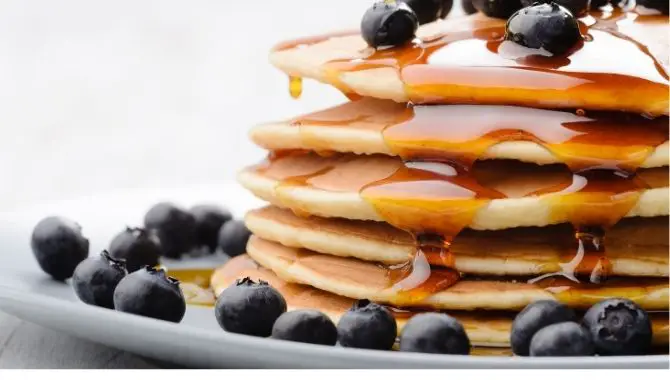Maple syrup is a delicious natural treat with a unique flavour. Poured over pancakes, ice-cream or waffles, it’s a sweet treat. Maple syrup is made from the sap of a tree, so it’s naturally free of animal products. Unfortunately, maple syrup production sometimes involves animal fat — something that’s not always made clear to consumers.
There are also some environmental concerns relating to maple syrup harvesting. Even so, it’s possible to find maple syrup that’s truly vegan if you look around. As with cane sugar, you just have to exercise a little caution when choosing which syrup to buy.
Is maple syrup vegan? Yes, maple syrup is a plant-based food that’s safe for vegans to eat. Vegans need to be careful when choosing maple syrup because some producers use animal fat during processing. Maple syrup can be processed without using animal fat, so it’s still vegan.
If you’ve arrived on this page, it’s likely that you have a lot of questions about maple syrup as a part of your vegan diet. Can vegans eat maple syrup? Where does maple syrup come from? What is in maple syrup, and how is it made? Does tapping maple syrup harm animals? Is maple syrup environmentally friendly? Can maple syrup be non-vegan? What do vegans need to know about maple syrup? Are there any good maple syrup recipes for vegans? Is maple syrup healthier than sugar? Read on, because we have the answers that you’re looking for.
Is maple syrup vegan?
Maple syrup is made from the sap of certain maple trees. It’s usually tapped from the helpfully named sugar maple, but also from black and red maples. Other maple trees may be tapped too. A spigot is inserted into the tree and the xylem sap is allowed to flow out. The sap is collected and boiled down to remove some of the water, making it thicker and sweeter with a more intense flavour. If it’s done with care, the process does not harm the tree; as long as you don’t take too much or tap the same tree too often, there should be no lasting effects.
So far, so vegan, right? What could be more wholesome than a natural plant product that doesn’t doesn’t kill the plant? Well, not so fast. Unfortunately, not all maple syrup stays vegan on its journey from the tree to your pancakes.
To turn the raw tree sap into a delicious syrup, it needs to be boiled first. Maple sap is already pretty sweet, but it has a fairly high water content. This means that the consistency is rather thin and the flavour is a little weak. Maple syrup producers remove the water by boiling the syrup. This creates a lot of foam, which is something the producers don’t want. To stop the syrup from foaming while it’s being boiled, manufacturers need to add a surfactant. What is this surfactant?
You’re really not going to like this. The most common de-foaming agent used in maple syrup production is animal fat. That’s right: they take a completely vegan product made from natural tree sap, and add lard. Worse still, the presence of animal fat doesn’t need to be declared on the label since the amounts used are very small. Infuriating, isn’t it?
Before you curse and purge your shopping list of all things maple syrup related, though, there’s some good news. The de-foaming agent does not have to be animal fat — there are plenty of effective vegetable alternatives. With a little care, you can ensure that your maple syrup is completely free from lard. Read on to learn more about how you can spot truly vegan syrups.
When is maple syrup not maple syrup?
The first thing you need to know when choosing your preferred product is that all “maple” syrups are not created equal. It’s very common for other substances to be marketed as if they were maple syrup when in fact they might contain only a small amount of real maple. Some contain none at all. Depending on where you live, there may be regulations that prevent non-maple syrup from being represented as maple. Even so, it can take a certain amount of scrutiny to spot the fakes.
If a syrup is labelled “Pancake syrup” or “Maple flavour syrup” it’s probably not maple. What you’re looking at is usually either can sugar syrup or high fructose corn syrup, dyed with caramel and other ingredients to look like maple syrup and flavoured to resemble the genuine article.
As well as being much less tasty and possibly worse for your body, these syrups are not always strictly vegan. Those made with cane sugar are particularly dubious, as cane sugar is often refined using bone char. This, in case the name didn’t tip you off, is a material compose of carbonised animal bones.
Corn syrup is a bit more debatable from a vegan perspective. Corn (specifically maize) is, of course, a vegetable. The process of refining the maize for its sugars doesn’t involve animal products, so we’re okay there. Unfortunately, most of the maize used to make corn syrup is genetically modified. It may contain genes from all sorts of worrying sources, from bacteria and viruses to jellyfish and even humans. However you feel about GMOs in general, jellyfish genes don’t sound terribly vegan.
Corn syrup has a reputation for being especially unhealthy, too. The science is a little vague on this point; in general, it’s just a good idea to consume refined sugars in moderation.
To avoid sugar and corn syrup, look for brands that state they are made with pure maple syrup. Avoid “pancake syrup” and similar imitations.
Real maple syrup: finding vegan varieties
Now that you know how to spot fake maple syrup, the next step is to seek out varieties that don’t contain any animal fat.
First, look for organic maple syrup. According to the official guidelines for the certification of organic maple sap and syrup, no animal fat can be used in the de-foaming process. Vegetable fats can still be used, but these too have to be certified organic. Organic maple syrup is also more sustainably harvested. We’ll get bac to that later.
Another trick is to look for kosher maple syrup. Food purity is very important in Judaism and for a food to be kosher, it certainly can’t contain pork fat. Thus, kosher maple syrup is probably vegan too.
Many producers are now aware of the concerns regarding animal products in maple syrup, and have cut to the chase by simply labelling their vegan syrup as such. If the bottle says “vegan” you’re good to go.
If you’re still uncertain, your best bet is to get in touch with the specific company that makes the product you’re curious about. Most companies are very forthcoming. You might be able to find the information on the company’s website — check the product page for the maple syrup product you’re interested in to see if it mentions the vegan status of the syrup. If not, you can phone or email the company and ask them whether their maple syrup involves animal products at any stage.
Is maple syrup environmentally friendly?
Your maple syrup may be free from animal ingredients. For strict vegans, though, the story doesn’t stop there. If, like me, you’re a vegan partly out of concern for the environment, you’ll want to know if maple syrup harvesting is sustainable and responsible.
If you stick to organic maple syrup, the answer is a resounding yes. While irresponsible maple syrup harvesting can harm trees and damage the local environment, organic maple farming is actually beneficial.
Organic maple syrup is produced without toxic pesticides and other dangerous chemicals. The trees are tapped carefully, with only a modest amount of sap being taken at any one time. Tapping is rotates, with each section of the maple forest being allowed to rest and recover before being tapped again. Using organic maple syrup from responsible producers helps to support the planting and protection of more maple trees.
Maple syrup is delicious and highly versatile. You can use it in all sorts of recipes. I like to add it to yogurt and incorporate it into my baking. My favourite recipe is a vegan virgin mojito, combining lime, sparkling water, mint and plenty of organic maple syrup for sweetness. As with any high sugar product, you should consume maple syrup in moderation.
Welcome to VeganClue - My name is Robert Van De Ville and together with my team we spent hundreds of hours researching the most relevant topics for Vegans and non yet Vegans. Are you looking for more information about Veganism, animal welfare, diet, health, and environmental benefits of the Vegan lifestyle? You are in the right place! Enjoy the site.

